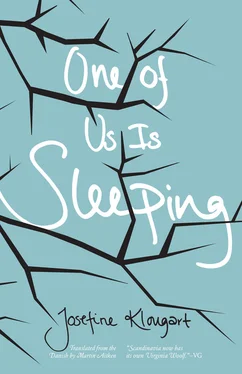SHE HELPS HIM into the shower. He is feeble and slack, and though her sleeves are meticulously rolled up she is quickly soaked. She talks to him. About the soap, about whether he is able to stand on his own while she washes his hair; she tells him to be careful and not to fall; she says the lather is rinsed away now, and asks if he can dry himself or wants her to help. His eyes flicker, he is angry, but too tired to do anything about it. Sick, and incapacitated by alcohol. She rubs his hair with the towel.
He gets up, it is well into the afternoon and she isn’t there.
The apartment is empty.
He stands in the last rays of sun as they slant weak warmth down between the roofs of the buildings opposite. He imagines Arizona, fields of maize, grasshoppers consuming unscrupulously. She has a feeling inside her, as though she were separating an egg, passing the yolk from hand to hand, the fragile yolk that might break at any moment. She remembers all the objects she has broken. A small vase. A cup he gave her once. A glass that stood out only on account of being green in a particularly detached and dusty kind of way. Stand still, he says. She gathers the shards in her hand. Stand still, he says again, this time with annoyance. You’ll cut yourself. I won’t cut myself. That evening he tells her he thinks her parents scolded her unduly as a child. For breaking things. That had to be why, the reason she gets so upset. But it wasn’t like that at all, quite the opposite, she thinks to herself. She finds it unreasonable not being allowed to be saddened by time passing. By doing things that cannot be undone, by suddenly dying. That is what a person cries over when they break a glass — no more than that, spilled milk, borrowed time.
He wakes up alone in the apartment, most of the day gone. She is out buying groceries. But how is he to know. He thinks she is angry, but she cannot be angry at all. Disappointment is a greater, more satisfying revenge, one may think, and perhaps it might be true.
JUST THE FACT of getting away from the city. They stay in a summer house. She reads Tove Ditlevsen and thinks of all the similarities. How alike people can be, across all boundaries. He sits uneasily in the shade of the parasol. The fabric lends his face an oddly blue tinge. A newspaper has blown from the table, some hours ago now, and has disintegrated, its pages draping the shrubs, covering up the dry straw. What remains lurches through the garden, like an army in dissolution, soldiers searching for survivors. Are you thinking about your mother, he asks her. They look at each other. She gives a shrug: not really. She’ll be all right, he says, and looks down at his book again, only then to go on, how remarkable she is. You mustn’t think it’s you, you mustn’t think that at all. But I haven’t done anything wrong, she tells herself; you haven’t done anything wrong, he tells her. She nods.
There’s no one here, she whispers. They have come through the back garden, through the gap in the hazelnut, behind the house and the woodshed. Everything has been left so neatly , the dishwasher emptied, the table wiped. They have walked all the way from the summer house to Agri. But no one is here. They find some fizzy drinks in the fridge and sit out on the patio. Only that doesn’t feel right either. They feel like burglars. She hangs the key back where it belongs, on the nail under the eves. He sends messages to Copenhagen, a couple each day. She doesn’t care. It may be a bad sign, and she thinks about that. We’ll give it one last chance, she hears him say, mostly for his own benefit; it’s like he can’t be talked into anything, the sheer impossibility of him. And then coffee, drowsiness, exhaustion, perhaps the heat. They chink glasses in a toast. They drink, and make love, and live their separate lives, together again in the midst of the summer, in this recollected landscape, this recollected summer house. Do you remember this, remember that, the time I nearly broke that window helping your parents pull down the old cladding. Always the disputes of chronology, for which reason it’s easiest to leave it out when reminiscing, together. Where does that thought come from: that they are only together because they can’t stand the thought of having forgotten something. An odd mistrust of memory, an odd displeasure at its existence.
HER MOTHER SQUEEZES her hand. Sometimes it’s hard to understand, she says. She thinks she does, and yet tries to see the incomprehensibility of it. She stays with her parents for a few days, it is the winter holiday, they were supposed to have been together, she and the new man, the dead man’s successor, the nocturnal worker, while everyone else sleeps, a moonlight contract, the body refusing to give up anything at all. But only she is here. She keeps waiting to be, what — unhappy.
However it may look, that kind of sorrow .
The sofa is so deep you either have to sit on the edge and not lean back or else succumb with legs outstretched. She feels the springs through the fabric of the upholstery, hears their metallic complaint as she settles into place.
Her father comes home and nothing about him seems changed. He is the same person, though there is no guessing who. His moods are arbitrary, as if they depend only on themselves, regardless of circumstances. The time his father died, her mother gathered her daughters on the old red sofa, their legs dangling above the floor, it is as if all the furniture has grown smaller since then, the gardens shrunken, unlike nature, oddly enough, whose proportions are unaltered; wild. She told them Daddy very likely feels sad, that’s the way she put it. That they were to show consideration and be nice to him. And yet he came home and there was nothing to be detected, he was no more broken, no more repaired than usual, one minute at ease, the next quivering with tension. That constant unpredictability. I come home, abandoned by a man who passed through my hands and died; I come home, abandoned by the new man, and on neither occasion is he moved by it. In the midst of my doubting I will ever be alive again, or even want to be; I think to myself that in a way it ties us together. Both of us unpredictable. A rhythm that remains the same, regardless. A threat. They have already parted, or else they will never part. Nothing new under the sun.
SHE PRACTICALLY STOPS eating. Hardly anyone is concerned about the fact, and then suddenly they are worried sick. They travel to Italy, she and a girlfriend, and she perspires until thin, up and down the hills of Cinque Terra, in the streets of Levanto, where spring is coy and reluctant. It is the coldest spring in forty years, at least, says the eldest brother in the family-run hotel on the coast of Amalfi. They are the only guests, their guests. They sit in the café on the edge of the cliff, the sea its tall baseboard of blue. He tells her, as best he can in his own peculiar variety of English, that his parents are dead, that now only the three brothers remain. They don’t think they can afford a room, and are allowed to put up their tent on the patio in front of the house. He unlocks the door of an annex, leaving it open so they may creep in to sleep at night. The extravagance of the blue sea, Italian espresso maker in chrome and shining red, men in attendance. The Italian wants her to guess how old he is, but she doesn’t want to, she knows he is over fifty. He pulls a chair out at her table and sits down. She has no newspaper from which to glance up, nothing to put aside, and instead must rearrange her napkin. His lips begin to speak before he utters a sound, he wants to take her sailing with him, he says. Tonight. Fishing, he corrects himself. She dares not, declines, and feels she has never regretted anything as much ever before; the night that could have been.
Читать дальше












